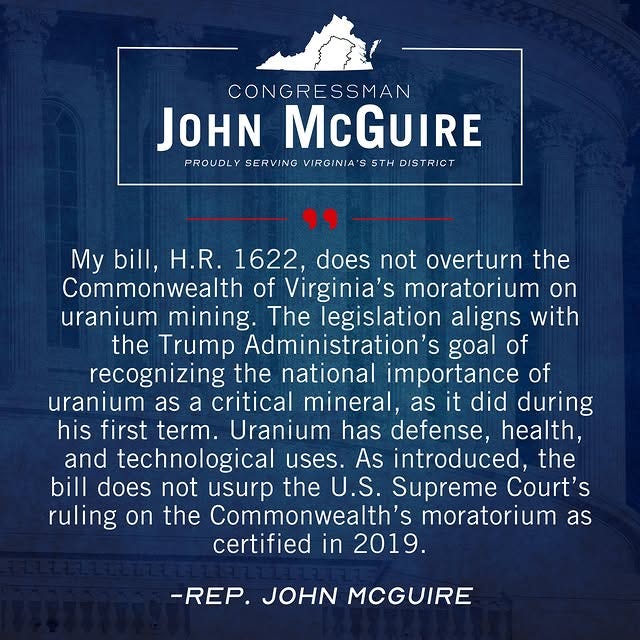Why is uranium mining so high on John McGuire's agenda?
I have theories!

When candidate John McGuire knocked on doors around the 5th district during last fall’s campaign, he surely heard a lot about the issues of day. Immigration. The economy. The deficit. Abortion.
One thing I bet nobody said—at least nobody he met on the street or going door to door—is, “What we really need is more uranium mining. But not here in Virginia. Just everywhere else. Get to work on that, will you?
Which is why it’s a little puzzling that, now that he’s in office, Rep. McGuire has filed a bill that would do just that. It’s only the second bill he has filed as a sponsor. (The first one has to do with allowing heavier farming vehicles on Virginia’s interstate highways.) The theory is that increasing the domestic supply of uranium will make the U.S. less reliant on foreign sources of fuel for our nuclear plants.
McGuire is taking pains to point out that his bill wouldn’t overturn Virginia’s ban on uranium mining, which has been in place since 1982:
So why would he introduce a bill that ostensibly doesn’t actually affect his state, much less his district?
Four theories
1) He believes it’s sound policy.
As Rep. McGuire points out, his bill aligns with the Trump administration’s priorities. In fact, it would codify something the first Trump administration did through regulatory changes, and the Biden administration undid.
But we’re never going to come remotely close to mining all our own; the U.S. has only 2 percent of the world’s uranium and not nearly enough to meet our needs. If the goal is to secure our supply, it would make more sense to stay on good terms with the countries that have a lot. Like Canada, for example—with whom we just started a trade war that includes a 10 percent tariff on imported uranium.
In any case, none of this would explain why domestic uranium mining seems to be a priority for a freshman congressman from a state where it’s illegal.
2) It’s a favor to campaign donors.
Honestly, I started my research assuming this was the case. Rep. McGuire has touted his ties with executives from the nuclear industry. Plus, the largest untapped uranium supply in the country is in his district, and evidently it’s valued at $6 billion. But I couldn’t find any donations to him from uranium or nuclear-power companies, or major local landowners, in the Federal Elections Commissions’s database of campaign donations. On the other hand, I’m new to FEC filings and may have missed something, so I can’t rule it out.
3) It paves the way to lifting Virginia’s ban.
If uranium mining picks up around the country, it’ll be easier to make the case that we should lift the ban here.
4) It’s a stalking horse for fossil fuels.
McGuire’s bill eases the regulatory hurdles for uranium by adding it the federal government’s list of 50 minerals that are critical to America’s economy and security. Companies that dig for any of these critical minerals—which include lithium, aluminum, and cobalt—don’t have to meet the same strict environmental regulations as other mining companies do.
If you looked at the list, you might’ve noticed that oil, coal, and natural gas aren’t on it. That’s because federal law specifically says that fuels don’t count as critical minerals.
What happens if uranium makes the list? It becomes harder to argue for keeping other fuels—like oil, coal, and natural gas—off of it. And if they got added, then they too would be subject to lower environmental standards and less regulation.
Admittedly, it would be premature to get too worked up about this bill. It’s been referred to a House committee, and it’s not clear when or whether it’ll come to a vote. Most bills never become law anyway.
But given the way Rep. McGuire has positioned himself as a culture warrior and hammered on illegal immigration, it’s enough to make you wonder how uranium made it onto his agenda.

